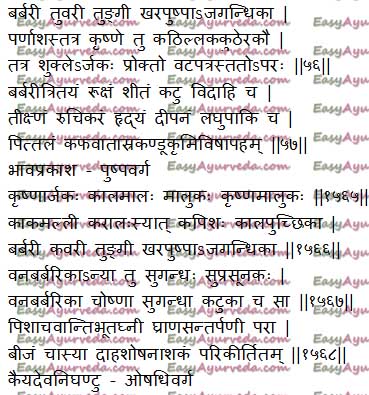Basil (Ocimum basilicum, Sabja Seeds) – Uses, Remedies, Dose, Research, Side Effects
By Dr Renita D’Souza
Basil / sabja seed is widely used as a culinary spice and known as Ayurvedic herb used to treat cough, poisoning, headache, diarrhea, intestinal worms etc. It is known as Barbari in Sanskrit.
Table of Contents
Introduction
Sweet Basil essential oil is used to flavor food, relieves indigestion, flatulence, constipation, cough, asthma etc. It is used in aromatherapy and relieves stress. It acts as antibacterial, anti-fungal and insect repellent.
It is extracted by steam distillation from the leaves and the flowering tops Ocimum basilicum.
Botanical Name – Ocimum basilicum
Synonyms – Ocimum nigrum, Ocimum thyrsiflorum
Family – Lamiaceae ( Tulasi kula)
Read – Tulsi – Ocimum sanctum – Benefits, Research, Side Effects
Home remedies – Barbari
Traditional Remedies of Sweet basil (barbari)
- To relieve cough, juice of vantulsi along with honey or the infusion of seeds is given.
- In diarrhea, seed infusion is given. It is considered as absorbent (grahi) in nature.
- For scorpion bite, leaf paste is applied externally.
- In snake bites, 50 – 60 ml of juice is given every four hours.
- Juice is made used externally to relieve ear pain and toothache.
- Juice is applied overhead to control dandruff. It is also applied in scalp ringworm.
Qualities, uses, types
Medicinal Qualities of Barbari herb (sweet basil)
Taste – katu (pungent),
Virya (potency) – shita (cold)
Qualities of Barbari (vantulsi)
Ruksha – dry
Tikshna – sharp and penetrating in nature
Laghu – light to digest
Actions
Vidahi – causes burning sensation
Ruchikarak – improves perception of taste
Hrdya – cardiac tonic
Deepana – carminative
Special qualities of Barbari
Pishachavanti – protect from evil spirits
Bhutagni – relieves psychiatric disorders
Effect on Tridoshas
Pittala – increases pitta dosha
Balances Vata and Kapha dosha
Traditional Uses of Sabja seed:
Blood disorders
Kandu – itching
Krmi – intestinal worm infestation
Visha – poisoning, toxic condition
Juice of the barbari is considered sharp, penetrating (tikshna), hot, dry in nature. It balances Vata dosha, induces sweating and relieves worm infestation.
Qualities of barbari seeds
Taste – sweet
Potency (virya) – cold (shitha)
Snigdha – unctous
Diuretic
Sthambhana – styptic
Relieves burning sensation and emaciation (shosha)
Varieties of Barbari (vantulasi)
Reference – Bhavaprakasha Nighantu
1. Kali Van Tulsi (krshna)
Sanskrit Synonyms – Katillaka, Kuteraka
2. Saphed Van Tulsi (shukla)
Sanskrit Name – Arjaka
3. Vatpatr
Shloka, controversy, dose
Controversy
In Raja Nighantu, Barbari is mentioned as the synonym of Bharangi herb.
Read – Bharangi Clerodendrum serratum Uses, Side Effects, Dose

Parts Used
Whole plant, seeds
Dose
Juice – 3 – 5 ml
Seed powder – 3 – 6 grams
Side effects, chemistry, pharmacology
Side Effects of Barbari Herb
There are no recorded side effects.
However, an excess dose can cause stomach irritation, burning sensation or constipation.
Due to the hot and sharp quality, it is better to avoid its usage in high pitta conditions, heavy menstrual bleeding, bleeding disorders, pregnancy and lactation.
Chemical constituents of Ocimum basilicum
Terpenoids, alkaloids, flavonoids, tannins, saponin glycosides and ascorbic acid.
Pharmacological Activities of Ocimum basilicum
Hepato-protective, immunomodulatory, anti-hyperglycemic, hypolipidemic, anti toxic, anti-inflammatory, antibacterial and antifungal.
Pharmacological Activities of Basil essential oil
It possesses high antioxidant, antimicrobial, anti-hypertensive, anticancer and anti-inflammatory activities.
Research
1. Read review on phytochemical and pharmacological studies of Ocimum basilicum (a)
Morphology of Ocimum basilicum
Ocimum basilicum is an erect herb that grows to a height of 30 – 60 cm. Leaves 2-5 cm long, opposite, ovate and aromatic. Flower pale purple or white, arranged in a terminal spike . Nutlets, small, ellipsoidal and black. Stem glabrous, hairy at the nodes.
Distribution
Ocimum basilicum is native to tropical Asia, Africa and America and cultivated in Europe, South-west Asia and the USA.
Interaction with medicines, supplements
Can this be used while taking Homeopathic medicine?
Yes. This product does not react with homeopathic medicine.
Can this medicine be continued while taking supplements like multivitamin tablets, Omega 3 fatty acids etc?
Yes. Generally, this product goes well with most dietary supplements. However, if you are taking more than one product per day, please consult your doctor for an opinion.
With western
medicines
Seek your
doctor’s advice if you are taking this product along with other western
(allopathic / modern) medicines. Some Ayurvedic herbs can interact with modern
medicine.
If both Ayurvedic and allopathic medicines are advised together, then it is
best to take Allopathic medicine first, wait for 30 minutes and then take the
Ayurvedic medicine.
Distribution, different names, medicines
Names in different languages
Hindi Name – Barbari, Bambari, Vantulsi, Baarbara, Ram Tulsi
English Name – Common basil, Sweet basil
Bengali Name – Babui tulsi, Khubkalam
Kannada Name – Kaama gaggare, Kaama kasturi
Malayalam Name – Pach-cha-pushpam, pachcha, ram-tulasi, tirunetru, kattuthrithavu
Marathi Name – Bhu-tulasi, Sabaja
Gujarati Name – Ran tulsi, Damaro
Tamil Name – Tirunittru, Chankanirakkarantai, Chapchavitai, Tirtuthpathachi
Punjabi Name – Baburi, Babari
Telugu Name – Bhu-tulasi
Urdu Name – burg faranjmushk, burg firanjmishk
Ayurvedic Medicines with Ocimum basilicum as Ingredient
Ocem 5 Drops – It is an Ayurvedic medicine mainly used in chronic respiratory conditions and influenza.
Surasadi tailam – Used in the treatment of sinusitis, bronchial diseases, cough, chronic catarrh and chronic wounds.
Classical categorisation
Bhavaprakasha Nighantu – Pushpa Varga
Kaiyadeva Nighantu — Aushadi Varga
Shodala Nighantu – Shatapushpadi Varga
Sanskrit synonyms
Barbari, tuvari, tunghi
Kharapushpa, Ajaghandika
Parnasha
Kreshnarjaka, kalamalah, Maluka
Krshnamaluka, Kakamalli
Scientific Classification
Kingdom – Plantae
Division – Magnoliophyta
Class – Magnoliopsida
Order – Lamiales
Family – Lamiaceae
Genus – Ocimum
Species – basilicum
Binomial Name – Ocimum basilicum
Spices, basil, dried
Taste – pungent, bitter
Guna – light, dry, sharp
Veerya – hot
Vipaka – pungent
Effect on Doshas
Vata balancing – due to hot, sharp properties
Pitta increasing – due to pungent, hot properties
Kapha balancing – due to pungent, bitter tastes, hot, dry, light qualities.
Click to Consult Dr Renita D’Souza
Systemic action
Leaf has Analgesic, Anti inflammatory, Sirovirechana properties. Seed has wound healing action and also helps to cure burning sensation.
Digestive System – Carminative, facilitates normal movement of doshas, Anti helminthic, Seed is unctuous in nature. Indicated in Loss of digestive fire, Anorexia, Abdominal distension, Helminthiasis etc. Seed is used in Dysentery.
Circulatory system – Cardiac stimulant, Seed act as blood purifier also indicated in bleeding disorders, Bleeding piles etc.
Excretory system – Increases urine production, Seed is indicated in Dysuria
Respiratory system – Helps the expulsion of Vitiated kapha
Reproductive system – Indicated in Oligomenorrhea. Seed is Aphrodisiac in nature.
Tvak – Indicated in skin disorders
Tapakrama – Antipyretic, Seed is Dahaprasamana (relieve burning sensation)
Satmikarana – Seed and Root is indicated in poisonous conditions. Seed is indicated in general debility.









